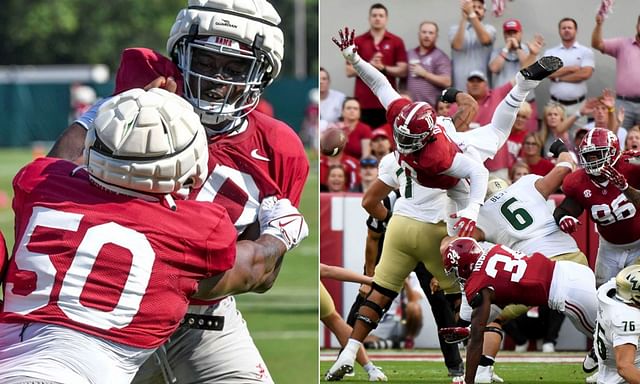Jehiem Oatis, the towering defensive lineman who once symbolized promise and physical dominance along Alabama’s defensive front, is no longer silent. The former four-star prospect and Crimson Tide standout has broken his silence about his departure from the Alabama football program, delivering a blunt and eye-opening statement that has sent shockwaves across college football. “They were literally messing me over,” Oatis said in a recent interview, pulling back the curtain on what he alleges was a deeply frustrating and disheartening experience under the storied program.
For a program that has built its reputation on NFL-level development, championship expectations, and an elite culture of performance, Oatis’ comments reveal a rare glimpse into what can go wrong behind the scenes, even for a player with star potential. At 6-foot-5 and over 300 pounds, Oatis was expected to be a centerpiece of the defensive line after an impressive freshman campaign. Instead, the Mississippi native’s career in Tuscaloosa ended in confusion, disappointment, and a growing sense of betrayal.
Oatis arrived at Alabama with high expectations. As a member of the 2022 recruiting class, he was ranked as one of the top defensive linemen in the nation. He quickly became a fan favorite due to his remarkable transformation — dropping significant weight to improve his conditioning — and his early impact on the field. He appeared in key moments during the 2022 season and showed flashes of the kind of disruptive force Alabama’s defense is known for. His combination of size, agility, and work ethic made him a future anchor in the trenches, or so it seemed.
However, something changed.
According to Oatis, things began to deteriorate during his second season in Tuscaloosa. He claims he was passed over for opportunities, misled about his role, and ultimately left in the dark about key decisions that affected his development and visibility. “It’s like they didn’t want me to succeed,” he said. “I kept doing everything I was told. I kept grinding. But the more I gave, the less I got in return.”
This kind of accusation from a player of Oatis’ caliber doesn’t just raise eyebrows — it challenges the very system that Alabama has built under both Nick Saban and now new head coach Kalen DeBoer. While Oatis did not single out any particular coach by name, the implication was clear: somewhere within the Alabama program, a disconnect had formed that derailed what could have been a defining college football career.
While college football is no stranger to players transferring in search of better opportunities, it’s uncommon for former players to speak so openly and pointedly about internal conflicts at powerhouse programs. Oatis’ words echo a growing trend of athletes reclaiming their narratives — telling their side of the story rather than quietly exiting stage left. And in an age of player empowerment, NIL deals, and transfer portal mobility, the balance of power is shifting ever so slightly from institutions to individuals.
The timing of Oatis’ comments is also notable. Coming in the first offseason under new head coach Kalen DeBoer, Alabama is in the midst of a significant identity shift following the retirement of Nick Saban. DeBoer has promised to uphold “The Alabama Standard” while implementing his own vision for success. But if Oatis’ experience is any indication, some structural or cultural issues may need urgent attention.
Oatis did not disclose all the details of what he experienced behind closed doors, but his use of the phrase “literally messing me over” suggests deeper issues that likely extended beyond the football field. “It wasn’t just about playing time,” he said. “It was how I was being treated, how I was being managed. At some point, it stops being about football and starts being about respect.”
For Alabama fans, these revelations are jarring. The Crimson Tide pride themselves not only on championships but on being a place where talent is cultivated and maximized. When players leave, especially ones with as much potential as Oatis, the default assumption is often that the athlete failed to meet expectations. Oatis’ testimony flips that assumption on its head — he suggests it was Alabama, not him, that failed to uphold their end of the bargain.
Supporters of the program may push back, pointing to Alabama’s long track record of sending players to the NFL and the sheer competitiveness of securing a starting role. Yet Oatis isn’t arguing that he deserved to be handed anything. Instead, he’s arguing that he was misled, undervalued, and ultimately alienated within the very system that once promised to elevate him.
Reactions across the college football world have been mixed. Some fans and analysts express sympathy, recognizing the toll that internal dysfunction and miscommunication can take on young athletes. Others suggest that Oatis’ comments may reflect frustration more than fact, and caution against overreacting to one perspective without hearing the full story from Alabama’s side.
Still, what can’t be ignored is the broader trend Oatis’ story represents. Players are no longer just passive participants in a program’s narrative. They are stakeholders, brands, and storytellers in their own right. The transfer portal has made it easier than ever for athletes to pursue new opportunities — but it has also empowered them to be more vocal about their experiences, both good and bad.
As for Oatis, he has already begun the next chapter of his career. Though he has not officially announced his new destination at the time of this writing, he has made it clear that he’s seeking a place where he’ll be “respected, developed, and given a real chance to thrive.” For a player who once symbolized the next generation of Alabama dominance on the defensive line, it’s a bittersweet departure — and a cautionary tale.
His story serves as a reminder that the college football machine, no matter how prestigious, isn’t perfect. Behind every highlight reel, there are countless hours of struggle, sacrifice, and sometimes, heartbreak. Jehiem Oatis may no longer wear the crimson and white, but his voice now echoes far beyond Tuscaloosa — a testament to the evolving power dynamic between athletes and the institutions that shape them.
If Alabama is to continue its reign atop college football, the program will need to reckon not just with its playbook and personnel, but with the experiences of the young men who dedicate themselves to the cause. Oatis’ departure — and his pointed words — may serve as the catalyst for those critical conversations.
In the end, Jehiem Oatis isn’t just walking away from a football team. He’s walking away from what he believed was a broken promise. And in doing so, he’s giving voice to a growing chorus of athletes demanding more than just playing time — they’re demanding to be heard.



